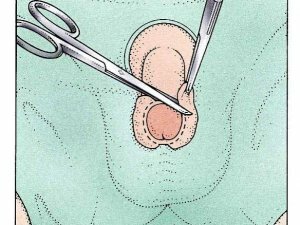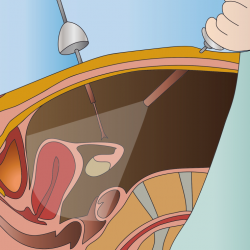Vesiculitis: Clinic, Diagnosis, Treatment
 The disease, characterized by inflammation of one or two seminal vesicles, is called vesiculitis or spermatocystitis. Seminal vesicles are formed at the site of the expansion of the seminal ducts, which are located from the epididymis to the neck of the bladder. The seminal vesicles exit into the urethra and are the storehouse of spermatozoa.
The disease, characterized by inflammation of one or two seminal vesicles, is called vesiculitis or spermatocystitis. Seminal vesicles are formed at the site of the expansion of the seminal ducts, which are located from the epididymis to the neck of the bladder. The seminal vesicles exit into the urethra and are the storehouse of spermatozoa.
Vesiculitis: clinic, diagnosis, treatment.
Vesiculitis as an independent disease is not spread. As a rule, it is the result of various infectious and inflammatory diseases and accompanies either some chronic disease of the genitourinary system( for example, prostatitis, urethritis, epididymitis), or diseases like angina or influenza. However, the vast majority of men with vesiculitis have chronic prostatitis.
An infection that promotes the development of vesiculitis can enter seminal vesicles in several ways: from the prostate gland, lymphogenous or hematogenous, through the posterior section of the urethra.
Vesiculitis: a clinic.
Vesiculitis can be chronic or acute.
Symptoms and course of the acute form of the disease are similar to the clinical picture of such a disease as acute prostatitis. In particular, for both diseases are characterized by an increase in body temperature, chills, acute pain in the area of the sacrum, groin and anus. In addition, with vesiculitis can occur frequent urination, pain at the time of ejaculation, as well as periodic long erections at night.
The causes of vesiculitis can be:
- hypothermia of the whole organism;
- permanent seating position;
- frequent constipation;
- continued abstinence;
- excessive sexual activity;
- no traffic;
- suppression of immunity;
- inflammatory diseases, turning into chronic.
Chronic vesiculitis occurs much more often than the acute form of the disease. Characterized by chronic vesiculitis aching pain in the region of the sacrum, rectum and perineum. After a while, the appearance of pain during erection and the release of sperm with blood. In addition, the patient is disrupted urination. Symptoms of vesiculitis.
With vesiculitis, general weakness is observed, a constant increase in body temperature, excessive fatigue. There are pains, usually in the crotch and pubic region, giving in the sacrum, groin or lower back. Painful sensations, as a rule, are amplified by defecation or filled with a bladder. In addition, during defecation, there may be a discharge from the urethra. During sexual intercourse, ejaculation becomes painful, and there is blood in the sperm.
With acute vesicle, body temperature rises sharply and greatly, chills and headache appear. The analysis of urine shows some changes, as in inflammatory processes, and the analysis of fluid from seminal vesicles - the presence of abnormalities in the number of leukocytes and erythrocytes in the larger side. At ultrasonic research the increase in seminal vesicles in the sizes is observed.
With chronic vesiculitis the pains are aching and localized in the sacrum, in the rectum and perineum. Over time, there may be problems with urination, and erections can become painful. Sperm also contains blood.
Vesiculitis: diagnosis.
For the diagnosis of the disease, the following studies are carried out: rectal examination, ultrasound, general urine and blood tests, and seeding the secret of seminal vesicles. These methods most often determine the presence of the disease.
Vesiculitis: treatment.
When vesiculitis recommended bed rest, calmness, copious drink and abstinence from sexual intercourse. The acute stage of the disease, accompanied by a high body temperature, presupposes the use of anesthetics and broad-spectrum antibiotics. If there are difficulties with defecation, then laxatives or rectal suppositories with analgesics are prescribed. When the temperature drops, it is recommended to take hot baths, as well as put warmers on the crotch.
With chronic vesicles in the absence of contraindications, physiotherapy is prescribed, for example, massage of the seminal vesicles and prostate gland, mud therapy and magnetotherapy. This disease requires a fairly long treatment and careful monitoring of the tests.
Running vesiculitis leads to accumulation of pus in the seminal vesicles, which can be seen from the results of ultrasound and analysis. This is also said, and some symptoms. In this case, surgical intervention is necessary: opening of the seminal vesicles and their rinsing. In extreme cases, the vesicles are removed.
Prophylaxis of vesiculitis.
Any disease is easier to prevent than cure. Vesiculitis is no exception. So, if you suffer from frequent constipation, then pay attention to the diet and periodically take laxatives. With a sedentary lifestyle in the small pelvis stagnant blood, so take time for exercise or sports.
Excessive sexual contacts wear out the entire reproductive system, so sometimes it is useful to refrain from them. However, prolonged abstinence also will not bring anything good, because in this case the secret stagnates in the seminal vesicles and becomes more susceptible to infection. To the male genitals were healthy, sex life should be regular, but not permanent.
Infection spreads throughout the body, without bypassing the seminal vesicles for some untreated diseases, as well as with general cooling of the body. Therefore, in order to avoid complications, timely and fully treat diseases, without forgetting to take vitamins all year round, tempering and eating right.



